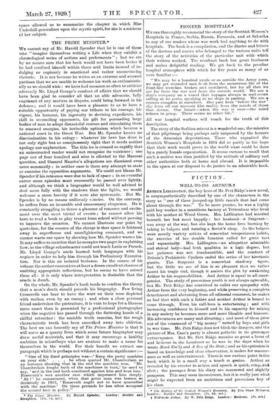THE PRIME MINISTER.*
WE cannot say of .Mr. Harold Spender that he is one of those who "imagine themselves writing a Life when they exhibit a chronological series of actions and preferments " ; but we are by no means sure that his book would not have been better if he had confined himself within those arid limits instead of in- dulging so copiously in emotional and rather unconvincing rhetoric. It is not because he writes as an extreme and avowed partisan that we are unable to welcome his work as enthusiastic- ally as we should wish : we have had occasion so often to criticize
adversely Mr. Lloyd George's conduct of affairs that we should have been glad to consider all that an able advocate, fully cognisant of any matters in dispute, could bring forward in his
defence ; and it would have been a pleasure to us to have a suitable opportunity of paying our tribute to his courage, his vigour, his humour, his ingenuity in devising expedients, his skill in reconciling opponents, his gift for persuading large bodies of men to adopt distasteful courses and stimulating them to renewed energies, his invincible optimism which became a national asset in the Great War. But Mr. Spender knows no discrimination in his eulogy : whatever. his hero has done is not only right but, so conspicuously right that it needs neither
apology nor explanation. The thin ice is crossed so rapidly that an uninstrueted reader would not recognize its existence ; one page out of four -hundred and nine is allotted to the Marconi question, and General Maurice's allegations are dismissed even more summarily ; in neither ease is there any attempt to state or examine the opposition. arguments. We could not blame Mr.
Spender if his reticence were due to !sok of space ; in an eventful career some episodes must necessarily be passed over lightly, and although we think a biographer would be well advised to deal more hilly with the shadows than the lights, we would welcome a stern brevity if it were also systematic. But Mr. Spender is by no means uniformly c oncise. On the contrary. he suffers from an incurable and unnecessary eloquence. He is constantly struggling to throw a glamour of romance and excite- ment over the most trivial of events ; he cannot allow his hero to read a book or play truant front school without pausing to improve the occasion. We cannot illustrate our point by quotation, for the essence of the charge is that space is frittered away in superfluous and unenlightening comment, and we cannot waste our spar* by showing how Mr. Spender wastes his. It may suffice to mention that he occupies two pages in explaining how, as the village schoolmaster could not teach Latin or French. Mr. Lloyd George's uncle learned both languages with his nephew in order to help him through his Preliminary Examina- tion. Nor is this an isolated Instance. In the course of his volume the author encounters at least a dozen excellent chances of omitting appropriate reflections, but he seem to have missed
them all : it is only where interpretation is desirable that the oracle is dumb.
On the whole, Mr. Spender's book tends to confirm the theory that a man's death should precede his biography. Few living Cromwells can bear to have the wart on their nose depicted with realism even by an enemy ; and when a .close personal friend undertakes the portraiture, it is vain to hope for a likeness more exact than is presented by a professional photographer when the negative has passed through the flattering hands of a skilful retoucher : the amiable truth remains, but the rough
characteristic truth has been smoothed away into oblivion. The best we can honestly say of The Prime Minister is that it
will serve as a quarry from which some future biographer may draw, useful materials, and that it may encourage a healthy ambition in schoolboys who are anxious to make a name for themselves in the world. For their benefit we extract one paragraph which is perhaps not without a certain significance --
" One of his fixed principles was—' Keep the party maehine on your side' . . . he often quoted Mr. Chamberlain as an instance showing that in the end the machine won. Mr. Chamberlain fought both of the machines in turn,' he used to say, 'and in the end both combined against him and beat him.' Roosevelt's was another case which impressed him deeply. Ah ! ' he commented, when that great man was beaten no decisively in 1913, Roosevelt ought not to have quarrelled with the machine.' On these grounds he has often accepted the second best in policy."
• The Prime Minister. By Harold Spender. london: Hodder sad . Stoughton. nos. net.]


































 Previous page
Previous page